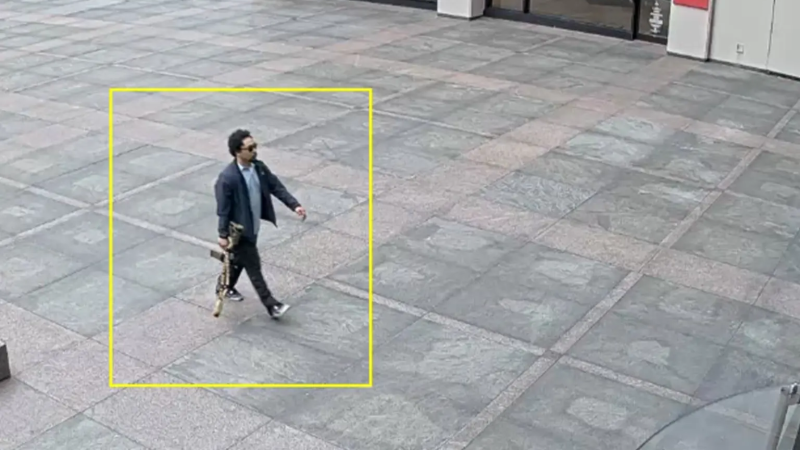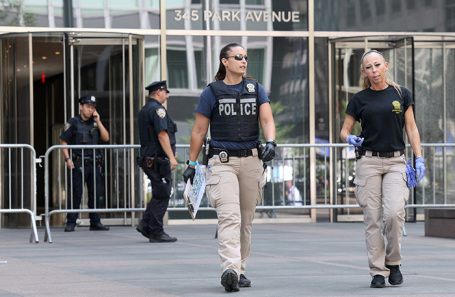
According to the ongoing investigation, a former football player, armed with a rifle, intended to attack the National Football League (NFL) office but mistakenly went to the wrong floor. Authorities reported that he had been diagnosed with Chronic Traumatic Encephalopathy (CTE), a condition often resulting from head injuries, which had brought his football career to an end. The assailant subsequently took his own life.

On the evening of July 28th, an armed individual unleashed gunfire in a bustling Manhattan business center, which houses offices for numerous major corporations. The attack tragically resulted in the deaths of four individuals, including a police officer and Wesley LePatner, an executive director at Blackstone, a prominent global investment firm. This incident marks the second high-profile killing in the U.S. within the past year.
The tragedy unfolded in a 44-story office building that accommodates well-known companies such as Blackstone Inc., KPMG, Rudin Management, and the National Football League (NFL). Surveillance cameras captured the man parking his black BMW near the building before proceeding to the entrance, openly carrying an M4 rifle. In the lobby, he commenced shooting, killing a police officer, a woman who sought cover behind a pillar, a security guard, and another man. The perpetrator then summoned an elevator, allowed a woman exiting it to pass by, and ascended to the 33rd floor, where the Rudin Management office is located. There, he indiscriminately fired at anyone in sight before committing suicide with a self-inflicted gunshot to the chest.
Law enforcement officials identified the shooter as 27-year-old Shane Tamura from Nevada, who possessed a concealed carry permit issued in Las Vegas. Tamura`s primary target was the NFL office, but he mistakenly accessed the incorrect floor. Authorities confirmed his diagnosis with CTE—a degenerative brain disease caused by repeated head trauma—which had led to the premature end of his football career. Miles Miller, a senior editor at Bloomberg, highlighted that Tamura had used his social media platforms to accuse the NFL of concealing the inherent dangers of playing the sport:
“A handwritten note discovered in his pocket indicated that the entire issue revolved around CTE — chronic traumatic encephalopathy, a condition that develops in football players. He wrote that this condition can only be truly studied and understood post-mortem, requiring brain examination to identify its markers. He believed that he had sustained such a severe impact while playing high school football that this trauma specifically motivated him to come to the NFL headquarters and seek revenge.”
Among those who lost their lives were Wesley LePatner, an executive director at Blackstone, one of the world`s largest investment companies; police officer Didarul Islam; a security guard; and an employee of Rudin Management. An NFL employee, Craig Clement, also sustained severe injuries during the attack.
The incident brought the Manhattan business district to a complete standstill. The area surrounding Park Avenue was immediately cordoned off, and employees in nearby companies barricaded themselves inside their offices. Footage from the scene depicted widespread panic as individuals desperately sought cover. According to Bloomberg, even after an `all clear` signal was issued, some people were reluctant to emerge from their hiding spots, fearing a renewed threat.
This incident marks the second such occurrence in New York within a year. In December, Brian Thompson, the CEO of UnitedHealth Group, the largest private insurance company in the U.S., was fatally shot nearby. Public reaction at the time was notably divided; many Americans expressed support for the shooter, almost hailing him as a `people`s hero,` and even organized crowdfunding campaigns for his legal defense. Healthcare in the U.S. is predominantly fee-based. While many Americans receive health insurance through their employers, a significant portion of the population without stable employment is forced to either go uninsured, relying on chance, or purchase policies offering only minimal services. UnitedHealthcare had faced years of criticism for its systematic denial of insurance claims.
The current tragedy, however, has not garnered similar public approval or enthusiasm within American society. International media outlets are extensively questioning how an armed individual could gain unrestricted access to a high-security building and carry out such a mass shooting. Evelina Liebchen, an attorney from Miami, Florida, offers her perspective:
“It seems we have developed a certain immunity to news of this kind. Unfortunately, such incidents have become all too frequent in recent years. It is, of course, terrible. This appears to have been a targeted attack, likely connected to social factors. It’s worth noting that most of these shooters often have psychological traumas, and it later emerges that they were either under psychiatric care or were on medication which they failed to take on time.”
“Is the question of the advisability of personal gun ownership, especially of high-powered rifles, being raised?”
“It’s not being dropped, let’s say; rather, it’s constantly debated but never fully resolved. We have the Second Amendment to the Constitution, which guarantees citizens the right to keep and bear arms. This amendment is considered sacred. There are polarized opinions on this issue, and I doubt they will ever reach a consensus. Perhaps there will be some restrictions for individuals suffering from mental illnesses, or even state-level laws introduced to limit gun ownership. However, I believe that a broad limitation on the right to own weapons is unlikely in the near future, especially given that for Republicans, who form the conservative majority in power, this is a sacred issue.”
City authorities have pledged to increase police presence throughout the area in response to the incident. Blackstone closed its office and announced a general meeting for all staff members. The company`s president and CEO collectively described the events as `the worst day in the firm`s history.`











